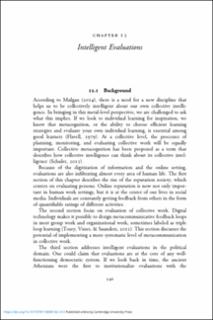| dc.contributor.author | Baltzersen, Rolf K. | |
| dc.date.accessioned | 2022-09-25T23:19:32Z | |
| dc.date.available | 2022-09-25T23:19:32Z | |
| dc.date.issued | 2022 | |
| dc.identifier.uri | https://hdl.handle.net/11250/3021116 | |
| dc.description | Chapter 10 in Cultural-historical perspectives on collective intelligence
In the era of digital communication, collective problem solving is increasingly important. Large groups can now resolve issues together in completely different ways, which has transformed the arts, sciences, business, education, technology, and medicine. Collective intelligence is something we share with animals and is different from machine learning and artificial intelligence. To design and utilize human collective intelligence, we must understand how its problem-solving mechanisms work. From democracy in ancient Athens, through the invention of the printing press, to COVID-19, this book analyzes how humans developed the ability to find solutions together. This wide-ranging, thought-provoking book is a game-changer for those working strategically with collective problem solving within organizations and using a variety of innovative methods. It sheds light on how humans work effectively alongside machines to confront challenges that are more urgent than what humanity has faced before. This title is also available as Open Access on Cambridge Core. | en_US |
| dc.description.abstract | Chapter 10 analyzes the relationship between citizen participation and citizen expertise, particularly in the political domain. New types of intelligent citizen engagement are emerging like mass deliberation, mass voting, and social media activism. Mass deliberation describes the evolvement of new democratic institutions that aim to recruit citizens in direct participation. Two examples, the Citizens' Council in Ostbelgien and the online ideation platform Better Reykjavik, are part of this new trend. Mass voting is another type of citizen participation that has become increasing popularity because of the internet. Technological platforms make it easy to let everyone vote, such as the Five Star Movement does with its party members in Italy. Social media activism has also become increasingly important. This involves both informal political debate and political activism, which the social movement My Stealthy Freedom exemplifies. All these CI projects build on different conception of participatory diversity. In addition, transparent collective work is important in promoting intelligent engagement between large groups, both in scientific work like crowd peer review or political processes like the Icelandic constitutional experiment. However, there is a concern about the threats against democracy that dysfunctional engagement pose such as fake news and echo chambers in social media. | en_US |
| dc.language.iso | eng | en_US |
| dc.publisher | Cambridge University Press | en_US |
| dc.rights | Attribution-NonCommercial-NoDerivatives 4.0 Internasjonal | * |
| dc.rights.uri | http://creativecommons.org/licenses/by-nc-nd/4.0/deed.no | * |
| dc.subject | Mass deliberation | en_US |
| dc.subject | Citizens' Council in Ostbelgien | en_US |
| dc.subject | Better Reykjavik platform | en_US |
| dc.subject | Mass voting | en_US |
| dc.subject | Five Star Movement | en_US |
| dc.subject | Transparent collective work | en_US |
| dc.subject | Crowd peer review | en_US |
| dc.subject | The Icelandic experiment | en_US |
| dc.subject | Crowdsourcing bills of law | en_US |
| dc.subject | Social media activism | en_US |
| dc.subject | My Stealthy Freedom | en_US |
| dc.subject | Dysfunctional engagement | en_US |
| dc.subject | Tight engagement | en_US |
| dc.subject | Loose engagement | en_US |
| dc.title | Intelligent Engagement | en_US |
| dc.type | Chapter | en_US |
| dc.description.version | publishedVersion | en_US |
| dc.rights.holder | Rolf K. Baltzersen | en_US |
| dc.source.pagenumber | pp 276-312 | en_US |
| dc.identifier.doi | 10.1017/9781108981361.010 | |

